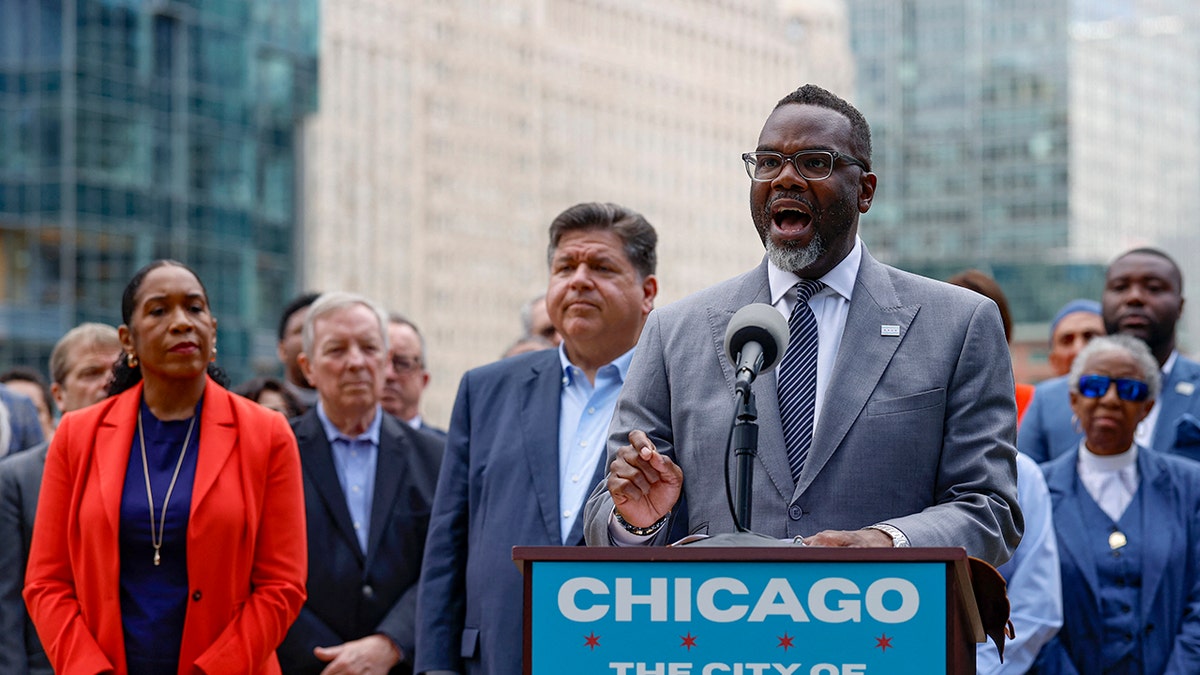NEWYou can now listen to Fox News articles!
Chicago Mayor Brandon Johnson has spent weeks criticizing President Donald Trump‘s threats to deploy National Guard troops to the city — a stance that some Republicans call a sharp reversal from the Democratic Party’s long-held opposition to “states’ rights” arguments.
While the legality of Trump’s actions remains to be seen — his federalization efforts are being reviewed by several federal and appeals courts this week — the move has sparked a fierce debate across party lines. Democrats, for their part, have denounced the move as unlawful and beyond the scope of Trump’s authority.
“The president has declared war on poor people,” Johnson said during a press conference, responding to Trump’s plan to send National Guard troops to Chicago. His comments followed a series of warnings from Democratic governors and mayors who argue that federalizing Guard units is both unnecessary and an unlawful intrusion into local authority.
Republican lawmakers and conservative commentators argue that Democrats are contradicting their past stance on state sovereignty. “Democrats were out of touch with reality the moment they said they don’t need President Trump’s help; everything is fine in Chicago,” Gianno Caldwell, a Chicago native and founder of the Caldwell Institute of Public Safety, told Fox News Digital.
PRITZKER SUES TRUMP TO BLOCK NATIONAL GUARD ACTION IN ILLINOIS

Chicago Mayor Brandon Johnson and Illinois Gov. J.B. Pritzker speak during a news conference in Chicago on Aug. 25, 2025. (AFP via Getty Images)
“When you look at the numbers, you look at the crime, 75% of the murders that are committed in Chicago are going unsolved. Seventy-five percent — that is a serious issue, a systemic issue that Chicagoans are dealing with on a daily basis,” Caldwell said.
Caldwell also pointed to a 2012 clash over the Obama administration’s Secure Communities program, which required local police to share fingerprint data with federal immigration agents. Republicans at the time accused Obama of hypocrisy for suing Arizona over strict immigration enforcement while taking no action against Democratic-led Chicago and Cook County, which sought to limit cooperation with federal authorities.
But others disagree, especially on claims of hypocrisy. “However you want to characterize it,” the accusations of hypocrisy “are a symptom of the poverty of our current political debate,” George Derek Musgrove, a history professor at the University of Maryland, Baltimore County told Fox News Digital in an interview.
“A lot of liberal Democrats, not conservative Democrats, in the 1960s, 1950s, and before that, were critics of states’ rights because segregationists were using the principle of federalism or states’ rights as a sort of ‘watchword’ to protect segregation,” Musgrove said.
“Today, the president is walking away from the idea of states’ rights because he wants to punish Democratic cities,” Musgrove said.
Trump, for his part, has characterized the actions as necessary to crack down on violent crime and to help carry out his administration’s policy priorities, including immigration enforcement.
But Democratic mayors, including Johnson, have rejected the notion that their cities are in the throes of violence necessary to warrant a military response. Johnson has emphasized the progress Chicago has made in reducing violent crime. (Homicides in Chicago have fallen 28% so far in 2025 compared to the same point last year, according to data from the city’s police department, and down by roughly 50% compared to 2020, when violent crime in many major U.S. cities peaked during the COVID-19 pandemic.)
Ultimately, Musgrove told Fox News Digital, the question of “hypocrisy” is too simplistic and fails to capture the broader context, principles and policies at stake in a given political moment.
TRUMP IS THREATENING TO ‘FEDERALIZE’ DC WITH NATIONAL GUARD AND MORE. HERE’S HOW THAT COULD PLAY OUT
Attorney General Pam Bondi testifies during a Senate Judiciary Committee oversight hearing on Capitol Hill in Washington on Oct. 7, 2025. (Mark Schiefelbein/AP Photo)
“It obscures what we’re really talking about. It walks away from the question of whether or not what the president is doing is legal,” he said.
“And it sort of shifts to this issue of hypocrisy, rather than dealing first with the fact [of whether] this is a legal question that can be decided in a court of law, based on legal principles.”
To that end, more clarity is expected soon. The 9th Circuit Court of Appeals is slated to review Trump’s ability to deploy troops to Oregon on Thursday — and regardless of how they rule, the matter is widely expected to be appealed to the Supreme Court.
BONDI CLASHES WITH DURBIN ON NATIONAL GUARD DEPLOYMENT: ‘LOVE CHICAGO AS MUCH AS YOU HATE PRESIDENT TRUMP’
Federal law enforcement officers arrive near an Immigration and Customs Enforcement facility in Broadview, Ill., on Oct. 3, 2025. (Erin Hooley/AP Photo)
Trump also has the ability to invoke the Insurrection Act, an 1807 law that gives the president additional powers in a national emergency.
Invoking that law would bring to the fore a whole host of new legal considerations, and Trump has suggested he would invoke the law if needed as recently as this week.
“If I had to enact it, I’d do it,” Trump told reporters Monday. “If people were being killed, and courts were holding us up, or governors or mayors were holding us up.”
Democratic leaders have also vowed to take action of their own to combat what they describe as unlawful overreach by Trump. Both California Gov. Gavin Newsom and Illinois Gov. JB Pritzker threatened Monday to withdraw their states from the National Governors’ Association if the group fails to condemn Trump’s deployment of other states’ National Guard troops to their jurisdictions.
CLICK HERE TO GET THE FOX NEWS APP
Asked by reporters Tuesday about the troop deployment, Trump defended his decision, saying only: “If you look at Chicago, Chicago’s a great city where there’s a lot of crime.”
“And if the governor can’t do the job, we will do the job,” he added.